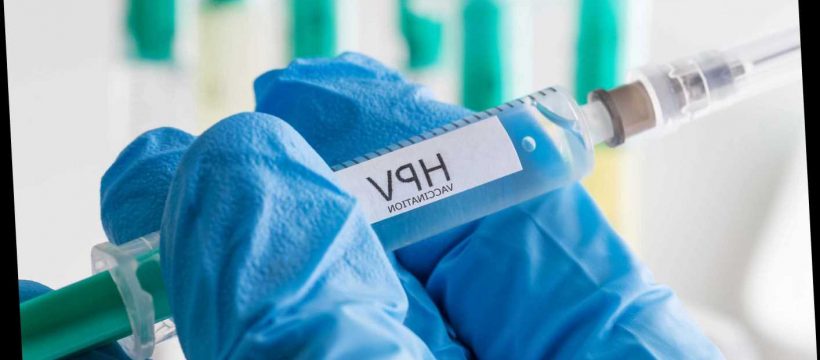HAVING the HPV vaccine could "wipe out" cervical cancer, a new study has revealed.
The jab has long been believed to radically reduce the risk of forms of cancer coming from the human papilloma virus (HPV).
But now for the first time, researchers have been able to say the vaccine definitely slashes of the disease, dubbed the "silent killer" because it can often go undetected until it's too late.
Jiayao Lei, one of the study authors at the Karolinska Institutet in Sweden, said: "This is the first time that we, on a population level, are able to show that HPV vaccination is protective not only against cellular changes that can be precursors to cervical cancer but also against actual invasive cervical cancer.
"It is something we have long suspected but that we are now able to show in a large national study linking HPV vaccination and development of cervical cancer at the individual level."
HPV is a group of viruses that commonly causes genital warts and different types of cancer, including cervical cancer, a disease that globally kills more than 250,000 women a year.
Long-term study
The study used long-term data of around 1.7 million women aged between 10 and 30 over a period of 11 years.
The data showed that around 500,000 women were vaccinated against HPV, the majority before the age of 17.
Just 19 vaccinated women were diagnosed with cervical cancer over the 11 years compared to 538 unvaccinated women – that's 47 and 94 women per 100,000, respectively.
The data showed that girls who had been vaccinated before 17 were a staggering 88 per cent less likely to develop cervical cancer.
What is HPV?
The human papillomavirus (HPV) is a very common sexually transmitted infection which affects at least half of people who are sexually active.
The STI is the most widespread worldwide and four out of five of the population will contract some form of the virus at least once in their life.
In most cases, the body's immune system will fight off the virus and there won't be any need for extra tests, in fact, some people may not even know they contracted it at all.
The HPV infection affects the skin and mucosa (any moist membrane, such as the lining of the mouth and throat, the cervix and the anus).
And different types impact different parts of the body, causing lesions e.g. HPV types 1 and 2 cause verrucas on the feet.
Out of the 100 identified types of HPV, around 40 of them affect the genital areas of men and women, and of these roughly 20 are associated with the development of cancer.
Meanwhile, women who had the vaccine between ages 17 and 30 were half as likely to be diagnosed with the disease as unvaccinated women.
Co-author Prof Pär Sparén, also from the Department of Medical Epidemiology and Biostatistics at Karolinska Institutet, said: "Girls vaccinated at a young age seem to be more protected, probably because they are less likely to have been exposed to HPV infection and given that HPV vaccination has no therapeutic effect against a pre-existing infection.
"Our study shows that HPV vaccination may significantly reduce the risk of cervical cancer, especially if completed at an early age.
"Our data strongly supports continuing HPV vaccinations of children and adolescents through national vaccination programs."
In the UK, girls and boys aged 12 to 13 are offered the jab as part of the NHS vaccination programme.
What is the HPV vaccine?
The vaccine helps protect against cancers which can be caused by the virus, including cervical cancer, some mouth and throat cancers as well as cancers in the genital and anal areas, according to the NHS.
It also protects against genital warts.
The vaccine is administered in two doses. It is first given to children in Year 8 at school (ages 12-13) and then a second dose 6 to 12 months later.
Both doses need to be given to be protected.
But anyone who missed their HPV vaccination at school can continue to have the vaccine up to their 25th birthday.
The HPV vaccine is currently given as a series of two injections into the upper arm.
People who get their first vaccination dose at the age of 15 or older will need to have 3 injections.
When the vaccination programme was first rolled out only girls were offered the vaccine but it was announced in July 2018 that boys aged 12 to 13 in England would also be vaccinated.
From the 2019-20 school year, 12 to 13-year-old boys and girls will both be eligible for the HPV vaccine.
Since April 2018, men who have sex with men (MSM) up to and including 45 years of age have been eligible for free HPV vaccination on the NHS.
Anyone up until age 25 is eligible to receive the vaccine for free on the NHS.
However, the HPV vaccine is available to women between the age of 25 and 45, but it has to be paid for privately.
It costs up to £165 per dose, and depending on your age, you may need two or three doses.
The vaccine is suitable for those who would like to start a course of the HPV vaccine or complete a course that was started at school.
For men, the vaccination will help prevent against the most common cause of genital warts, and it also protects against some types of cancer.
The vaccine is not suitable for pregnant women but it is suitable for breastfeeding women.
Source: Read Full Article

